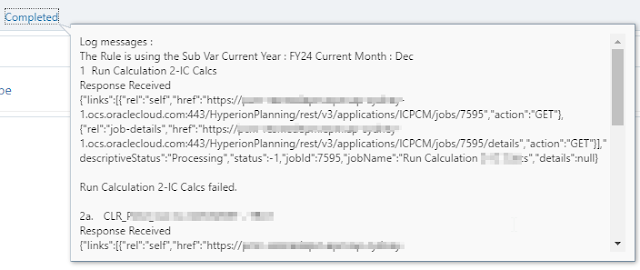In
this blog we will see how to run the EPCM (Enterprise Performance Management
Cloud) Calculation Manager rules using
groovy in a sequential manner also invoking Data Management rules as child jobs
using the jobFactory.
Groovy script is fetching substitution variable values from an operation's application and printing them. Here's a detailed explanation along with the provided script:
subVarValue is defined to fetch the value of a substitution variable from the application.
Also Sets the connection name, which is already predefined for the REST API to work.
def connectionName = 'Localhost'
Closure
subVarValue = { String subVar -> operation.application.getSubstitutionVariable(subVar).value
}
String
CurYr = subVarValue('CurYr')
String
CurMth = subVarValue('CurMth')
println
"The Rule is using the Sub Var Current Year : " +CurYr +" "
+ "Current Month : " +CurMth
Groovy
script is designed to monitor the status of a job running on a server and wait
for its completion. It polls the server at increasing intervals until the job
is completed.
Wait
for Completion Variable:
boolean
WaitforCompletion: This seems to be a flag indicating whether to wait for the
job to complete.
HttpResponse<String> jsonResponse: This holds the initial HTTP response from the server.
Await Completion Function:
- The
function awaitCompletion takes the initial JSON response, a
connection name, and the operation name as parameters.
- It
checks if the HTTP status code of the response is between 200 and 299. If
not, it throws an exception.
- It
parses the JSON response to read the job status and job ID.
- It keeps
polling the server at exponentially increasing intervals (up to 1000
milliseconds) until the job is no longer in progress.
- It prints whether the operation was successful based on the final status.
- The
function getJobStatus sends a GET request to the server to fetch
the current status of the job using the job ID.
- It
parses the response to read and return the job status.
- Polling
Logic:
The script uses exponential backoff for polling the job status, starting
from 50 milliseconds and doubling the delay until a maximum of 1000
milliseconds.
- Error
Handling:
The script throws an exception if the initial HTTP response is not
successful (status code not in the range 200-299).
- Job
Status:
It checks if the job status is IN_PROGRESS. If so, it continues
polling until the job completes.
- Print
Result:
It prints whether the operation was successful or failed based on the final
job status.
This
script should be integrated within a larger application context where the operation
object and its methods (application.getConnection and throwVetoException)
are defined
Run the EPCM Calculation using REST API & connection /************************************************************************************************/
/*
1. Run Calculation
*/
/************************************************************************************************/
println "1 Run Calculation"
jsonResponse = operation.application.getConnection("Localhost").post('/rest/v3/applications/PCM/jobs/')
.header("Content-Type",
"application/json")
.body(json([
"jobType":"Calculation",
"jobName":"Run Calculation",
"parameters":[
"povDelimiter":":",
"povName":"$CurYr:$CurMth:Actual:Working",,
"modelName":"IC
Calcs",
"executionType":"ALL_RULES",
"clearCalculatedData":"true",
"executeCalculations":"true",
"optimizeForReporting":"true",
"captureDebugScripts":"false"]
])
)
.asString();
println
'Response Received'
println
jsonResponse.body
WaitforCompletion = awaitCompletion(jsonResponse, "Localhost", "Run Calculation Calcs")
making an HTTP POST request to a specific endpoint (/rest/v3/applications/PCM/jobs/) on a server (presumably “Localhost”).
request includes a JSON payload with various parameters for the job, such as the job type (“Calculation”), job name (“Run Calculation”), and other settings.
After sending the request, you’re printing out the response received from the server.
Finally, there’s a call to awaitCompletion
Run the EPCM Clear job using REST API & connection
/***********************************************************************************************/
/*
2. Clear Job
/***********************************************************************************************/
println "2a. CLR_PCM_01"
jsonResponse
=
operation.application.getConnection("Localhost").post('/rest/v3/applications/PCM/jobs')
.header("Content-Type",
"application/json")
.body(json([
"jobType" : "Clear
Cube",
"jobName" : "CLR_PCM_01"
])
)
.asString();
println 'Response Received'
println jsonResponse.body
WaitforCompletion
= awaitCompletion(jsonResponse, "Localhost", "CLR_PCM_01")
Run the EPCM Merge jobs using REST API & connection
/**********************************************************************************************/
/*
3. Merge Data Slices
*/
/*
Rule Name: Merge Data Slices PCM.PCMRPT */
/**********************************************************************************************/
println "3. Merge Data Slices"
jsonResponse =
operation.application.getConnection("Localhost").post('/rest/v3/applications/PCM/jobs')
.header("Content-Type",
"application/json")
.body(json([
"jobType" : "Merge Data
Slices",
"jobName" : "Merge Data
Slices ICPCM.ICPCMRPT",
"parameters": [
"cubeName":
"ICPCMRPT",
"mergeSliceType":
"allIncrementalSlicesInMain",
"keepZeroCells":
"false"
]
])
)
.asString();
println 'Response Received'
println jsonResponse.body
WaitforCompletion = awaitCompletion(jsonResponse, "Localhost", "Merge Data Slices")
Calling the Jobfactory to invoke a Calculation
/***********************************************************************************************/
/*
4. Push to Reporting Cube */
/***********************************************************************************************/
JobFactory jf = operation.application.jobFactory
JobDefinition jobDef = jf.job("1_Push to
Reporting Cube", "Rules", [:])
Job job = executeJob(jobDef)
println job.status
// Print a message indicating the user who executed the rule
println("Rule
was executed by $operation.user.fullName")
/* Parameters to wait for DM Rules */
boolean
pushDataToRPT
HttpResponse<String>
jsonResponse
def
payload
def
awaitCompletion(HttpResponse<String> jsonResponse, String connectionName,
String operation) {
final int IN_PROGRESS = -1
if
(!(200..299).contains(jsonResponse.status)) {
throwVetoException("Error occured:
$jsonResponse.statusText")
}
// Parse the JSON response to get the
status of the operation. Keep polling the DM server until the operation
completes.
ReadContext ctx =
JsonPath.parse(jsonResponse.body)
int status = ctx.read('$.status')
for(long delay = 50; status == IN_PROGRESS;
delay = Math.min(1000, delay * 2)) {
sleep(delay)
status = getJobStatus(connectionName,
(String)ctx.read('$.jobId'))
}
println("$operation ${status == 0 || status == -1 ? "successful" : "failed"}.\n")
return status == 0
}
int getJobStatus(String connectionName, String jobId) {
HttpResponse<String> pingResponse =
operation.application.getConnection(connectionName).get("/" +
jobId).asString()
return
JsonPath.parse(pingResponse.body).read('$.status')
}
Run the Data Management rules using REST API & connection
println "3a Run PCM_CLC to RPT"
jsonResponse = operation.application.getConnection("DM-Localhost").post()
.header("Content-Type",
"application/json")
.body(json([
"jobType":"INTEGRATION",
"jobName":"PCM_CLC to RPT",
"periodName":"{$CurMth#$CurYr}",
"importMode":"REPLACE",
"exportMode":"STORE_DATA"
])
)
.asString();
pushDataToRPT =
awaitCompletion(jsonResponse, "DM-Localhost", "Push Data to PCMRPT")
Job Console Output
Hope
this is useful, Happy days on the Cloud!
.png)




To run Calculation Manager rules sequentially and trigger Data Management rules as a child job using Groovy in Oracle EPM Cloud, you can use the following approach. Groovy provides the flexibility to create advanced scripts that can manage rule execution and handle dependencies effectively.
ReplyDelete